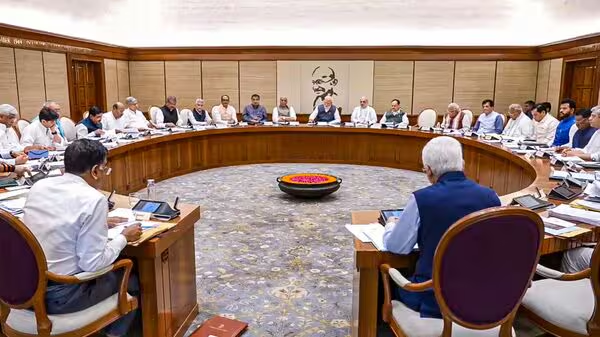
Operation Sindoor: Government Convenes All-Party Meeting on May 8 Amid Escalating India-Pakistan Tensions :
In the wake of escalating tensions between India and Pakistan following the recent military operation dubbed “Operation Sindoor,” the Indian government has called for an all-party meeting on May 8, 2025. This meeting aims to brief political leaders across the spectrum about the current situation and to seek a unified approach to national security and diplomatic strategies.
Background : The Pahalgam Attack and Operation Sindoor
The genesis of the current crisis lies in the tragic events of April 22, 2025, when a terrorist attack in Pahalgam, Indian-administered Kashmir, resulted in the deaths of 26 Hindu tourists. The Resistance Front, an offshoot of Lashkar-e-Taiba, claimed responsibility for the attack. In response, India launched “Operation Sindoor” on May 7, targeting alleged terrorist infrastructure in Pakistan and Pakistan-administered Kashmir.
The operation involved precision airstrikes using Rafale jets equipped with SCALP cruise missiles, targeting locations including Bahawalpur, Muridke, Gulpur, Bhimber, Chak Amru, Bagh, Kotli, Sialkot, and Muzaffarabad. Notably, the Bahawalpur strike reportedly killed close aides and family members of Jaish-e-Mohammed chief Masood Azhar. India justified the operation as a necessary response to terrorism, emphasizing the need to dismantle terror networks operating across the border.
Pakistan’s Response and Rising Tensions
Pakistan condemned the strikes as a violation of its sovereignty and labeled them as unprovoked aggression against civilians. The Pakistani military claimed to have shot down five Indian fighter jets, although India disputes these claims. In retaliation, Pakistan initiated heavy artillery shelling into Indian-controlled Kashmir, resulting in civilian casualties and widespread devastation in towns such as Poonch.
The situation has led to increased military mobilization on both sides, with fears mounting that the conflict could escalate further. International leaders, including those from the United Nations, the United States, China, and Russia, have urged both nations to exercise restraint and engage in diplomatic dialogue to de-escalate the situation.
The All-Party Meeting: Objectives and Significance
In this context, the Indian government’s decision to convene an all-party meeting on May 8 is a strategic move to ensure a unified national stance. The meeting aims to:
- Brief Political Leaders: Provide detailed information about Operation Sindoor, its objectives, outcomes, and the current security situation.
- Seek Bipartisan Support: Foster a consensus among political parties to present a united front in the face of external threats.
- Discuss Diplomatic Strategies: Deliberate on potential diplomatic measures to address international concerns and manage relations with Pakistan.
- Review Internal Security Measures: Evaluate the readiness of civil defense mechanisms and the need for public awareness campaigns.
Such meetings are crucial in democracies to ensure transparency, build trust among stakeholders, and formulate cohesive policies during crises.
Civil Defense Preparedness: Operation Abhyaas
In anticipation of potential escalations, India conducted “Operation Abhyaas,” a nationwide civil defense mock drill. This exercise tested air raid sirens, blackout simulations, evacuation drills, and public training exercises across 244 designated civil defense districts. Major cities like Delhi, Pune, and Bengaluru participated, demonstrating coordinated rescue and medical aid procedures.
These drills aimed to assess the readiness of emergency response teams and the effectiveness of communication systems, ensuring that the civilian population is prepared for any contingencies.
International Reactions and the Path Forward
The international community has expressed deep concern over the escalating tensions. Global leaders have called for immediate de-escalation and emphasized the importance of diplomatic engagement. The United Nations has offered to mediate, while countries like the United States and China have urged both India and Pakistan to exercise restraint.
As the situation remains volatile, the upcoming all-party meeting holds significant importance in shaping India’s approach. A unified domestic front, coupled with proactive diplomatic efforts, will be essential in navigating the challenges ahead and ensuring regional stability.
